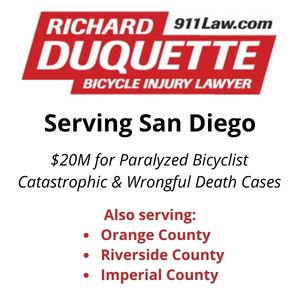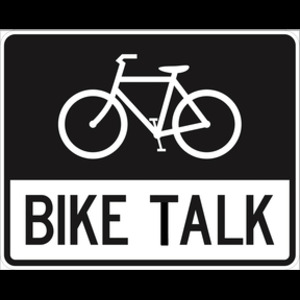
Scene of the collision, looking back towards oncoming traffic; photo courtesy of Biking Brian.
More bad news from south of the Orange Curtain, as a bike rider lost his life on Santiago Canyon Road.
According to the Orange County Coroner’s office, 21-year old Irvine resident Joseph Robinson was riding on southbound Santiago Canyon in Orange around 7 this morning when he was struck by a car south of Loma Ridge Road. He was pronounced dead at the scene at 7:04 am.
Unfortunately, no other information is available at this time.
Google’s street view shows an unprotected bike lane next to a two lane 55 mph speedway, with limited side access, suggesting the rider was most likely struck from behind. Although it’s always possible that he was sideswiped, or that the driver drifted over from the opposite side of the road.
At 55 mph, any collision is likely to be fatal.
Hopefully, more information will be available soon.
This is the 12th fatal bicycling collision in Southern California this year, and the first in Orange County; there were at least 12 bike-related deaths in the county last year.
My deepest prayers and sympathy for Joseph Robinson and his loved ones.
Thanks to the Seegmiller Law Firm for the heads-up.
Update: The story gets worse.
According to the Orange County Register, Robinson was killed by an 18-year old drunk driver.
Yes, 18-years old, drunk and behind the wheel at 7 am. And apparently speeding, despite the already high 55 mph speed limit.
The paper reports Sommer Gonzales was driving south on Santiago Canyon at an unsafe speed when she turned to the right, suggesting that maybe Robinson was killed in a right hook. (Update: It appears the reference to an unsafe turn refers to a deadly swerve into the bike lane, rather that a turn onto another road or driveway.)
Unfortunately, the rest is trapped behind their paywall. (Update: The Register has remove the paywall on this story.)

Ghost bike installed by coworkers at Irvine Jax; photo courtesy of Biking Brian.
Update 2: The story just keeps getting worse.
What was hidden behind the Register’s paywall was the news that Gonzales had fled the scene. According to the paper, she was arrested a short time later on suspicion of felony driving under the influence and felony hit and run; sounds like a charge of felony vehicular manslaughter would be in order, as well.
She’s expected to be in court today.
A comment from Dom below says she was seen fleeing the scene at high speed.
I am a rider and was second to come upon the crash site. An off duty fire fighter was on the phone with 911 as he saw the car that killed Joseph speeding and badly damaged just a mile or so from the crash, the driver was fleeing.
Joseph was deceased when I arrived just minutes after the hit and run. My deepest condolences go out to Joseph’s family and friends. May god have mercy on the murderer as I have none for her.
A post on the SoCal Trailrider’s forum identifies Robinson as an employee of the Jax Bicycle Center in Irvine.
This morning a friend of mine was hit and killed while riding his Road Bike on Santiago Canyon Rd by a hit and run driver. Joey worked with me at Two Wheels One Planet in Costa Mesa for about a year and was currently working at Jax in Irvine. He was 21. Joey was a really good road cyclist and one of the safest riders I know of. The woman who hit him fled the scene but we were told she was later caught. I don’t have a lot of information about it right now but Joey will be missed. Be careful out there!
http://theseegmillerlawfirm.com/blog…ad-loma-ridge/
Thanks to Lois, Ann, Dom and Brian for adding to this story. And thanks to the Orange County Register for making their story available to the public.
Update 3: If there’s a hero in this heartbreaking story, it’s OC firefighter Marc Stone.
According to a gut-wrenching, non-paywalled story in the OC Register, the paper tells how the off-duty Battalion Chief spotted a car with a smashed windshield driving in the opposite direction, and thought it may have hit a deer.
But this was Stone’s regular Sunday morning commute, and he knew bicyclists frequent the scenic road on weekend mornings.
“My gut instinct was just, ‘No one drives with a crunched-up windshield like that,’ ” he said. “I kept thinking, who would keep driving after hitting a person?”
He slowed down, and about three minutes later saw tumbleweed against the guardrail, damaged and smashed as if someone had hit them.
That’s when he saw a black bicycling shoe sitting on the road, next to the tumbleweed.
“Please tell me it isn’t so,” he said to himself.
After determining that the victim’s injuries were probably fatal, Stone called 911 to report what he’d seen.
An OC deputy spotted the car shortly afterwards, as Gonzales attempted to transfer her belongings to a friend’s car in a parking lot, where she was arrested by CHP officers.
The paper also reports that she was found in possession of meth and drug paraphernalia.
Update 4: Friends and coworkers remember Joseph Robinson in the latest Register piece, which is once again available to the public.
According to the Over the Hump website, there will be a memorial ride for Robinson this Wednesday evening.
Memorial Ride “Ghost Bike”
In honor of Joseph Robinson Jax Bicycle Center is holding a memorial ride on Wednesday, February 5th. We will be meeting at Jax Bicycle Center – Irvine at 6:30 am to ride to Joseph’s “Ghost Bike” memorial site on Santiago Canyon Road / Loma Ridge Jeep Trail in Orange, CA. For those of you who don’t wish to ride, you are welcome to drive to the “Ghost Bike” memorial which will take place at 7:15 am.
Memorial Ride
When: Wednesday, February 5th 2014 at 6:30 am
Where: Jax Bicycle Center – Irvine
14210-6H Culver Dr., Irvine, CA 92604
Ghost Bike Memorial Ceremony
When: Wednesday, February 5th 2014 at 7:15 am
Where: Santiago Canyon Road / Loma Ridge Jeep Trail in Orange, CA 92869
Thanks to Biking Brian for the head’s up. Update 5: Unbelievably, the driver, 18-year old Sommer N. Gonzales has been released without charges.
According to Rancho Santa Margarita Patch, prosecutors have asked the CHP to investigate further into the case before filing charges. California law only allows police to hold a suspect for 48 hours without filing charges.
She had been held without bail.
Why they can’t file preliminary charges to keep her in custody while the investigation continues is beyond me.
The site also clears up the confusion on how the collision occurred, saying Gonzales’ car drifted into the bike lane due to her impaired state.
Like this:
Like Loading...











